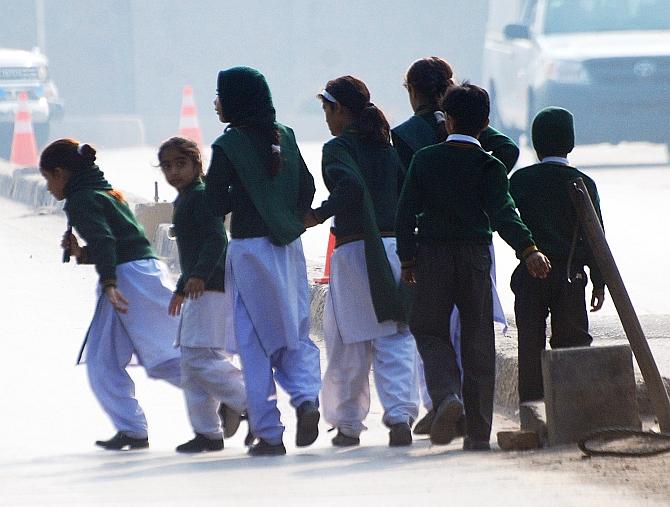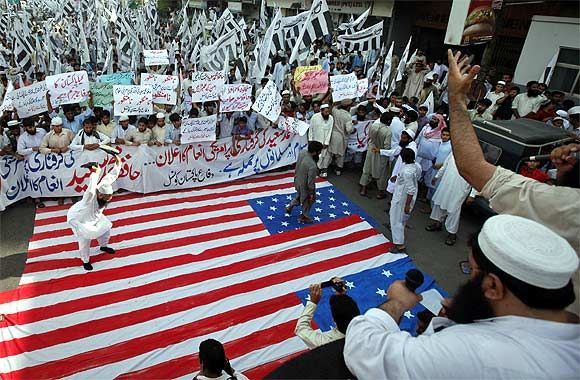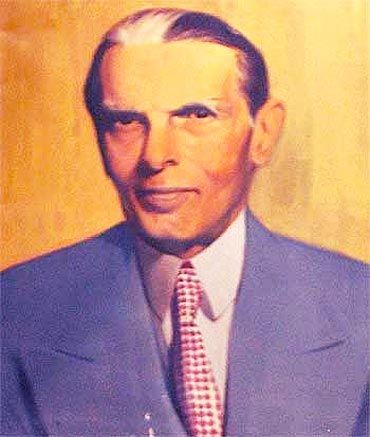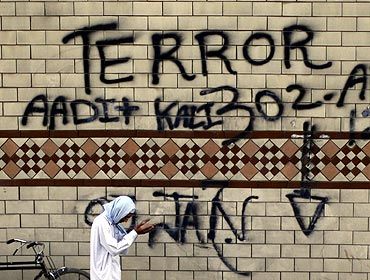 | « Back to article | Print this article |

'Pakistan is full of 'religious entrepreneurs' like Hafeez Saeed who poison the minds of the young so that they can be motivated to become terrorists. They work in concert with the rulers of Pakistan. It is a private-public partnership,' says Lieutenant General Ashok Joshi (retd).
The news of the horrendous killing of 132 school children in Peshawar on December 16 last year by a suicide squad of the Tehreek-e-Taliban Pakistan sent shock waves throughout the world. There was a natural outflow of sympathy for the victims.
If anything, sadder is the lot of those who have been left behind to grieve -- close relations, and friends. Their scars may never heal.
The reaction in India was no different from anywhere else in the world. The government led by the prime minister, Parliament, citizens and school children expressed their sympathy for the bereaved.
None could have even remotely imagined that 'Hindustan' had anything to do with this unfortunate happening. But former Pakistan president General Pervez Musharraf lost no time in claiming that the attack had been instigated and abetted by India using the TTP as a proxy.
It is unlikely that General Musharraf believes in this absurd conclusion himself. It is meant for the gullible in Pakistan who are likely to lap it up because they have been 'programmed' to do so. They have been made receptive to false beliefs about India by those who directly benefit from them.
There was a bombing of a Shia mosque in Shikarpur, Pakistan, by a faction of the Taliban -- Jundullah -- on January 30; the death toll was 61. Will Musharraf blame India for it?
The creation of false beliefs in the popular mind has been the stock in trade of the 'rulers of Pakistan', that is, the oligarchy of the Pakistan army. This has been so ever since the late Field Marshal Ayub Khan took over the reins of Pakistan after a coup d' etat in 1958.
The oligarchy of the Pakistan army has held sway since then directly, or indirectly. They are the prime implanters of false beliefs, or delusions in the popular mind, because they benefit from it.
They have made Pakistan believe all along that India is an existential threat and but for the competent and dedicated military oligarchy of Pakistan, the very survival of Pakistan would be at stake.
Even when a democratically elected government is in office, the reins are in the hands of this oligarchy. They are the primary creators of false beliefs or 'delusions.'

Pakistan is full of 'religious entrepreneurs' like Hafeez Saeed, who attract funds and political support in the name of religion and apply them to poison the minds of the young so that they can be easily motivated to become 'good terrorists.' They also work in concert with the rulers of Pakistan. It is a private-public partnership.
India bashing is an expressway to popularity. Budding politicians, the media, and the motivators of jihad have perforce to take to it to reach their destinations. This expressway is paved with multiple delusions. The delusions have now permeated the body politic of Pakistan.
No one except a few discerning individuals have kept their bearings. The vendors of delusions have already caused immense harm to all the nations of the Indian subcontinent, and will continue to do so.
As of now, there is only a thin sliver of hope that at least some of the elite outside the ruling cliques will realise that these delusions are not without a self destructive component. This, however, is unlikely to happen because Pakistan has been permeated by delusions -- seven of them -- since its inception.
These delusions concern us in India because they are the root cause of many ills from which India -- and the subcontinent -- suffers.
The first in the series was the pretence that the Partition of the subcontinent would be a bloodless and painless 'vivisection' for the greater good of the Muslim community.
 A Muslim majority Pakistan in the subcontinent would then coexist in peace and harmony with its neighbour. It would accommodate Hindus and other minorities who would be free to practice their religions. This delusion was the creation of the founder of Pakistan, Mohammad Ali Jinnah, left.
A Muslim majority Pakistan in the subcontinent would then coexist in peace and harmony with its neighbour. It would accommodate Hindus and other minorities who would be free to practice their religions. This delusion was the creation of the founder of Pakistan, Mohammad Ali Jinnah, left.
Having launched a violent direct action day on August 16, and exploited it to bamboozle the British into an early exit, surely he could not have believed in a bloodless partition. The British were in a hurry to split and quit, and they too were a party to the conjuring up of this delusion.
It is hard to believe that the founding father of Pakistan did not foresee the adverse impact of disrupting a natural economic zone. The economic activity in the subcontinent, for eons, had been along the economic highways and byways that connected centres of production, consumption and trade.
Religion played little or no part. Fragmentation of this single economic zone yielded ill will, disruption, and loss.
Partition did not prove to be a 'constructive destruction.' A single dimension of ethnicity, namely religion, was and is an insufficient cause for the partitioning of the Indian subcontinent.
The culture of the subcontinent has been syncretic and has always accommodated and absorbed the 'imports' while assimilating them. That partly explains the reason why Pakistanis and Indians are seen to be indistinguishable by all outsiders.
The pangs that the Indian subcontinent suffered and endured while giving birth to Pakistan were dreadful. The riots that presaged and accompanied Partition left not less than 300,000 dead and injured. The displaced persons were in excess of two million.
The anger and the hatred that Partition engendered on both sides of the international border were never fully dissipated or assuaged. They erupt in various forms although the visible immediate causes for conflicts are varied.
The second delusion was that the two wings of Pakistan, separated by more than 1,600 kilometres of Indian landmass, would endure and prosper as a single nation. Of course, Alaska and the US mainland are separated by the Canadian landmass, and yet that does not seem to cause any major problems. But the parallel ends there. Canada that separates Alaska is culturally not all that different from the US, and they are natural allies.
Pakistan had the choice of having friendly relations with India, but it abjured them. It chose instead to push infiltrators and tribesmen into Kashmir that had acceded to India. That apart, it systematically 'eliminated' Hindus and other minorities from Pakistan, so much so that their numbers have dropped down to 1.6 per cent of the population.
It was also instrumental in using the 'good terrorists' to drive away the Pandits from the Valley of Kashmir by using threats and force in the early 1990s.
The collective consciousness that defines a people as a distinct ethnic group -- the late Jinnah had used the word nation for people -- has multiple dimensions including language and culture. The distant eastern wing of Pakistan -- East Bengal -- had very little in common with its western wing except religion.
The people of East Bengal had and have enormous pride in their language and culture. They love music and Bengali poetry. Rabindranath Tagore is adored there as much as in West Bengal.
Every aspect of ethnicity other than religion, that was not prevalent in the west wing, was sublated, or even worse, ridiculed by the rulers of Pakistan. The people from the west wing, at least those who came in contact with the east wing, looked down upon them and their ways.
The rulers encouraged them to believe that the people of west Pakistan were more 'martial', or war-like, and were superior to the Bengalis. Bengali culture and language had necessarily to be denied.
In this atmosphere, religion could not hold them together as a single nation. The west wing and east wing separated violently from each other in 1971. This delusion took a terrible toll; some assess the number of casualties to be in the region of 3 million. A disproportionate number of them were Hindus.
In the meantime, India footed the bill for caring and feeding more than 10 million refugees who had been brutally driven out by a rampaging Pakistani army.
The third delusion is the 'belief' that Pakistan is not located on the Indian subcontinent; in 'reality' it happens to be an extension of the Middle East. The aim of the Pakistani ideologues is to distance their country from 'Hindu Bharat' and make it contiguous to the Middle East. Never mind the mountain barriers that separate the subcontinent from Afghanistan.
One could possibly rewrite history to please a particular constituency -- Pakistani textbooks give ample evidence of that -- but geography is not negotiable. The existence and continuities of the subcontinent cannot be wished away. Such considerations, however, have not thwarted some Pakistan ideologues -- from the ruling class -- from propounding strange theories. One of them looks upon the possibility of the union of Pakistan, Iran, and Afghanistan.
'An occupied Afghanistan is not in the interest of Pakistan and the region, whereas, an independent sovereign Afghanistan makes a reliable ally, together with Iran, to form the Pakistan-Iran-Afghanistan Union. The PIAU will thus provide the strategic depth to the States, in the same manner as the European Union provides depth of security to all members.'

Institutionally, the Inter Services Intelligence harbours the dream of an 'Islamic Caliphate including Afghanistan and the Central Asian Republics.'
The proposed union as well as the dream of a Caliphate rest on two unstated conclusions: a. Pakistan, being the land of Islam or Dar al-Aman (Islam) (external link) faces no threat except from the non-believers, and b. that it does face an existential threat from India being outside the pale, or Dar al-Harb.
Pakistan's rulers have chosen to believe and conduct themselves as if Pakistan is in the Middle East. Starting with the late president Zia-ul Haq, Pakistan has tried its best to pretend that ethnically Pakistan is closer to Saudi Arabia than India.
In the 1980s it supported Al Qaeda of Saudi origin. Zia also inculcated orthodoxy of Islam in the Pakistan army so that it started looking upon itself principally as the defender of Islam. The army embraced divisive and extremist Islam.
In the wake of this conviction have come intolerance and terrorism. The subcontinent pays heavily for this.